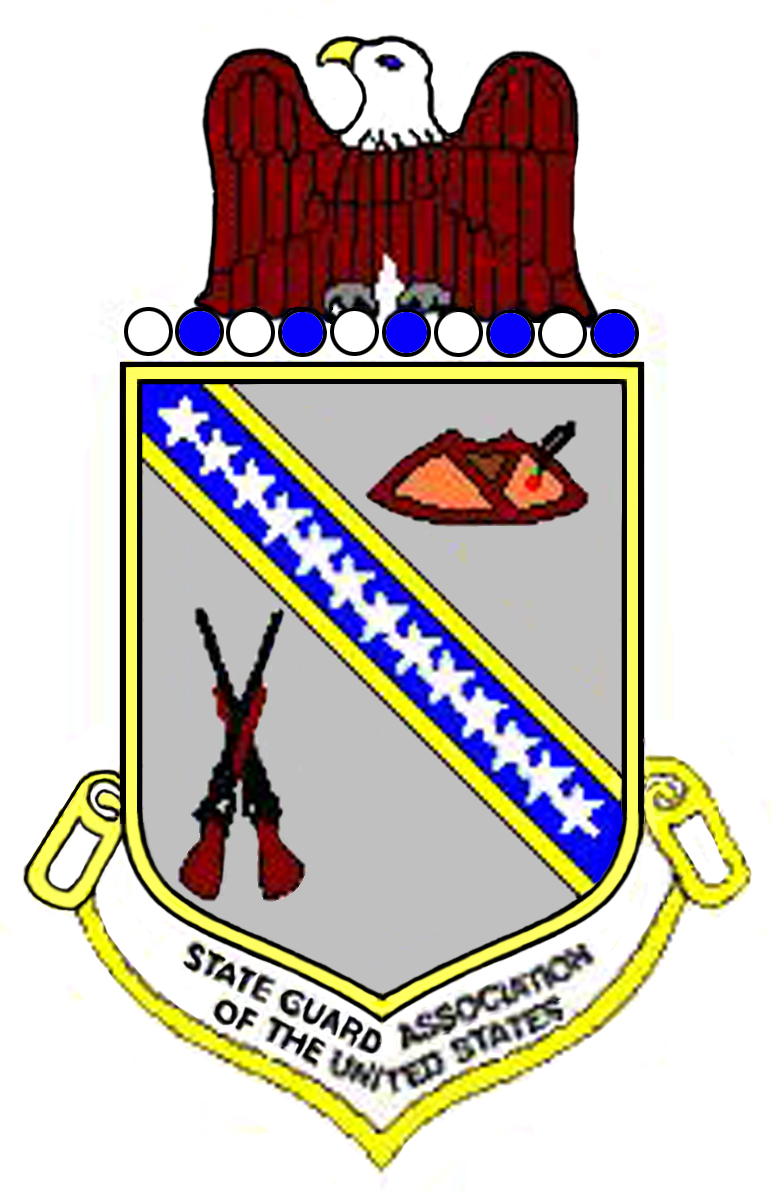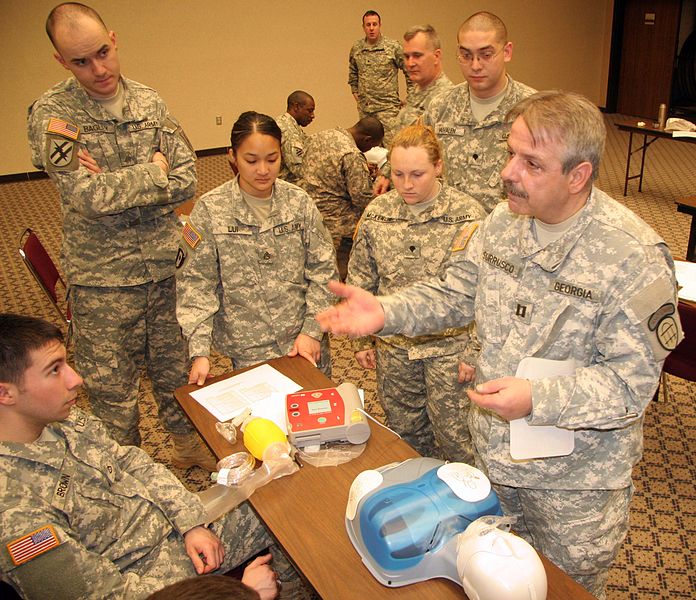You know, here's something that might pique some interest especially as this is something different for once:
The State Defense Forces until rather recently were more often than not ignored and neglected though admittedly they are still not at the strength that they could potentially be as after 9/11 some units were revitalized and became critical in local/state emergency response.
They are not like the National Guard (although they can be in conjunction and train alongside the National Guard), rather these units are as it says on the tin, organized and maintained by the states for the defense of the individual states though constitutionally they can be equipped by the Federal Government but the units are not liable to serve outside the United States (individual members, however, are not exempt from Selective Service and if the draft ever becomes necessary once again then just like anyone else who is eligible the individual State Guardsman can be drafted).
For instance, a certain famed backwoodsman named Alvin York was a commander in the Tennessee State Guard during World War Two and the Tennessee State Guard was reportedly activated during the Battle of Athens in 1946. Maryland as well as the then territory of Alaska also called out such formations upon U.S. entry into WWII.
Here is some source material to provide some context and all credits are due to the State Guard Association, Wikipedia / Wikia, the Indiana State Government, and, well, all rights are reserved to the respective owners and while some of this may be in the public domain, it is better to be safe than sorry and is in good faith.

 statedefenseforce.com
statedefenseforce.com

 en.wikipedia.org
en.wikipedia.org

 en.wikipedia.org
en.wikipedia.org

 military.wikia.org
military.wikia.org

 en.wikipedia.org
en.wikipedia.org
And to use an example of regulations/ the organization of a SDF including an authorized but not currently active component (a Marine Corps Battalion in case anyone is wondering):
Anyway recently I was thinking about why they weren't used as a basis for Civil Defense in regards to Fallout Shelters and whatnot instead of creating Civil Defense from scratch on the Federal level and also figure out the feasibility of upholding the organizations instead of neglecting them.
As a matter of fact, back in 1956 OTL, Congress authorized "state defense forces" permanently under Title 32, Section 109, of the United States Code, not to mention that both President Reagan and the Department of Defense in the 1980s actively encouraged the states to maintain the SDF units as well.
Given that I'm an bit inexperienced compared to the old timers who are familiar with the historical circumstances of the 1950s and 60s, I especially welcome the opinions of those who may know why it was decided to form Civil Defense from scratch or the feasibility of using them for Civil Defense purposes due to being available such as @Emperor Norton I and @RogueBeaver
Furthermore, maintaining such units at least more than on paper theoretically could alleviate the National Guard and free them up due to not having to be much concerned with Strategic Defense role much as, for instance, the Nike batteries of OTL could be manned by servicemen of the State Guard instead.
Of course at the same time the National Guard due to the above could be folded into the Army and Air Force Reserves due to the overlap but I'll digress.
Finally, this is again speculation on my part of course but assuming that the SDFs are maintained to an level sufficient to supplement the National Guard, it isn't unlikely they could provide an pool for optional continued training after Volunteers/Draftees finished their commitment whenever it was in the Regular Military or any reserve components of the respective branches including the National Guard as the National Guard are technically reservists, not a militia and Uncle Sam could encourage servicemen who are not interested in being lifers to contribute to the SDFs as an alternative to reenlisting for another two to eight years duration overseas.
Ultimately the question isn't just a matter of if the organizations can be properly maintained but the feasibility as well, especially as until the Korean War and flexible response, most military thinkers were assuming that conventional warfare was in the past and any future conflicts was inevitably nuclear i.e. the New Look Policy.
Now how feasible is this?
The State Defense Forces until rather recently were more often than not ignored and neglected though admittedly they are still not at the strength that they could potentially be as after 9/11 some units were revitalized and became critical in local/state emergency response.
They are not like the National Guard (although they can be in conjunction and train alongside the National Guard), rather these units are as it says on the tin, organized and maintained by the states for the defense of the individual states though constitutionally they can be equipped by the Federal Government but the units are not liable to serve outside the United States (individual members, however, are not exempt from Selective Service and if the draft ever becomes necessary once again then just like anyone else who is eligible the individual State Guardsman can be drafted).
For instance, a certain famed backwoodsman named Alvin York was a commander in the Tennessee State Guard during World War Two and the Tennessee State Guard was reportedly activated during the Battle of Athens in 1946. Maryland as well as the then territory of Alaska also called out such formations upon U.S. entry into WWII.
Here is some source material to provide some context and all credits are due to the State Guard Association, Wikipedia / Wikia, the Indiana State Government, and, well, all rights are reserved to the respective owners and while some of this may be in the public domain, it is better to be safe than sorry and is in good faith.

StateDefenseForce.com
New Article! The Evolution of the State Militia: From the 1903 Militia Act to the Modern National Guard and State Defense Force April 16, 2024 by Administrator Article | Edit We are thrilled to announce another featured article. This articles dives into The Militia Act of 1903, also known as the...
 statedefenseforce.com
statedefenseforce.com

State Guard Association of the United States - Wikipedia

State defense force - Wikipedia

State defense force
In the United States, state defense forces are military units that operate under the sole authority of a state government. State defense forces are authorized by state and federal law and are under the command of the governor of each state. State defense forces are distinct from their state's...

Naval militias in the United States - Wikipedia
And to use an example of regulations/ the organization of a SDF including an authorized but not currently active component (a Marine Corps Battalion in case anyone is wondering):
Anyway recently I was thinking about why they weren't used as a basis for Civil Defense in regards to Fallout Shelters and whatnot instead of creating Civil Defense from scratch on the Federal level and also figure out the feasibility of upholding the organizations instead of neglecting them.
As a matter of fact, back in 1956 OTL, Congress authorized "state defense forces" permanently under Title 32, Section 109, of the United States Code, not to mention that both President Reagan and the Department of Defense in the 1980s actively encouraged the states to maintain the SDF units as well.
Given that I'm an bit inexperienced compared to the old timers who are familiar with the historical circumstances of the 1950s and 60s, I especially welcome the opinions of those who may know why it was decided to form Civil Defense from scratch or the feasibility of using them for Civil Defense purposes due to being available such as @Emperor Norton I and @RogueBeaver
Furthermore, maintaining such units at least more than on paper theoretically could alleviate the National Guard and free them up due to not having to be much concerned with Strategic Defense role much as, for instance, the Nike batteries of OTL could be manned by servicemen of the State Guard instead.
Of course at the same time the National Guard due to the above could be folded into the Army and Air Force Reserves due to the overlap but I'll digress.
Finally, this is again speculation on my part of course but assuming that the SDFs are maintained to an level sufficient to supplement the National Guard, it isn't unlikely they could provide an pool for optional continued training after Volunteers/Draftees finished their commitment whenever it was in the Regular Military or any reserve components of the respective branches including the National Guard as the National Guard are technically reservists, not a militia and Uncle Sam could encourage servicemen who are not interested in being lifers to contribute to the SDFs as an alternative to reenlisting for another two to eight years duration overseas.
Ultimately the question isn't just a matter of if the organizations can be properly maintained but the feasibility as well, especially as until the Korean War and flexible response, most military thinkers were assuming that conventional warfare was in the past and any future conflicts was inevitably nuclear i.e. the New Look Policy.
Now how feasible is this?



